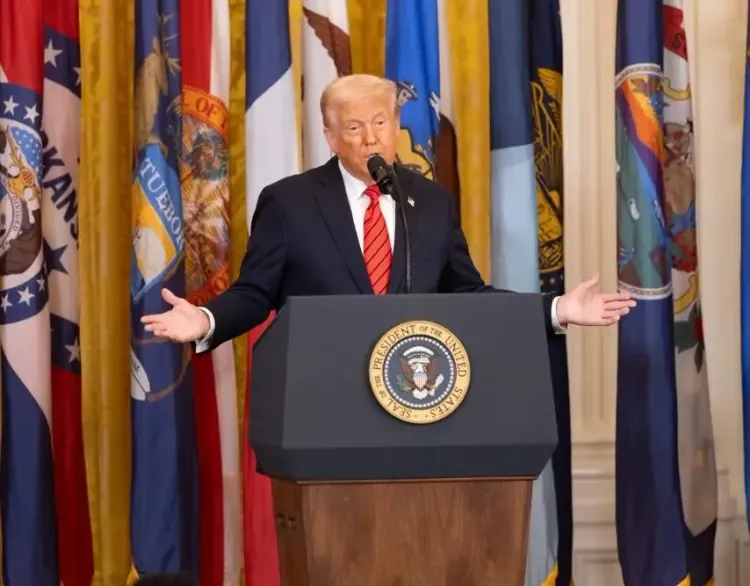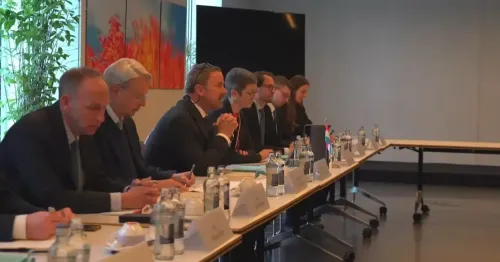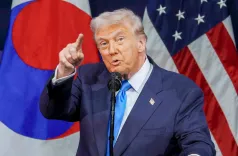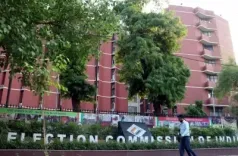Trump to Tackle Unfair Trade Practices with Tariffs

Synopsis
Key Takeaways
- Trump addresses unfair trade
- Reciprocal tariffs to be announced
- Focus on American manufacturing
- Trade talks with India ongoing
- Global implications anticipated
Washington, April 2 (NationPress) US President Donald Trump aims to tackle decades of unfair trade practices with the announcement of reciprocal tariffs on Wednesday. This move will be closely monitored globally, especially in India, according to the White House.
Trump has branded the announcement as “Liberation Day” but has attempted to ease concerns by stating that the tariffs will be “more lenient than reciprocal” and “kind.” Specific details regarding the extent of these tariffs have yet to be disclosed.
“Tomorrow, the President will confront the decades of unfair trade practices that have taken advantage of our nation and American workers,” said Karoline Levitt, the White House spokesperson, on Tuesday.
“These practices have devastated our middle class and harmed our heartland. The President is dedicated to realigning our global economy to restore America’s status as the manufacturing powerhouse of the world.”
“The President is always open to a call and a solid negotiation,” she added in response to inquiries about potential discussions following the announcement.
“He is primarily focused on correcting past injustices and ensuring that American workers receive fair treatment.”
Reports indicate that his advisors have considered multiple options: a 15 percent tariff on the so-called “Dirty 15” countries as defined by Treasury Secretary Scott Bessent, or a universal tariff applicable to all.
A notice in the federal register has identified possible targets for these tariffs, including India, Brazil, Canada, China, the European Union, Indonesia, Japan, Malaysia, Mexico, South Africa, South Korea, Switzerland, Taiwan, Thailand, Turkey, and Vietnam.
Trump mentioned on Monday that some countries have already started reducing their tariffs in anticipation of this announcement, including India and Europe. However, as the spokesperson reaffirmed, the White House remains open to negotiations.
Trump first declared his intention to implement such a tariff system during his inauguration address to eliminate “destructive trade deficits”, and he has stated it will take effect on April 2, avoiding any “April Fool” implications. These tariffs will be in addition to those already announced by Trump on imports from Canada, Mexico, and China—25 percent for Canada and two and 10 percent for Mexico and China respectively, along with a 25 percent tariff on all imported automobiles and auto parts.
While Trump has not provided specifics about the magnitude of the upcoming tariffs or the targeted countries, he has consistently highlighted India for its “brutal” tariffs and the trade deficit. The US trade deficit in goods with India was $45.7 billion in 2024, representing a 5.4 percent increase ($2.4 billion) from 2023, according to the US Trade Representative (USTR).
Total goods trade between the nations was estimated at $129.2 billion in 2024. American goods exports to India totaled $41.8 billion, a 3.4 percent increase ($1.4 billion) from 2023, while total US imports from India reached $87.4 billion, rising by 4.5 percent ($3.7 billion) from 2023.
Trade discussions between India and the US have occurred ahead of the anticipated reciprocal tariffs, but neither party has released specific details. “I believe it will work out very well between India and our country,” Trump stated on Friday when asked about trade negotiations with India.
“I’ll probably be more lenient than reciprocal, because if I were to apply reciprocal measures, it could be quite tough for many,” Trump mentioned in an interview with Newsmax last week. He again did not provide specifics.
“I know there are a few exceptions, and discussions are ongoing, but not too many,” the President added.










